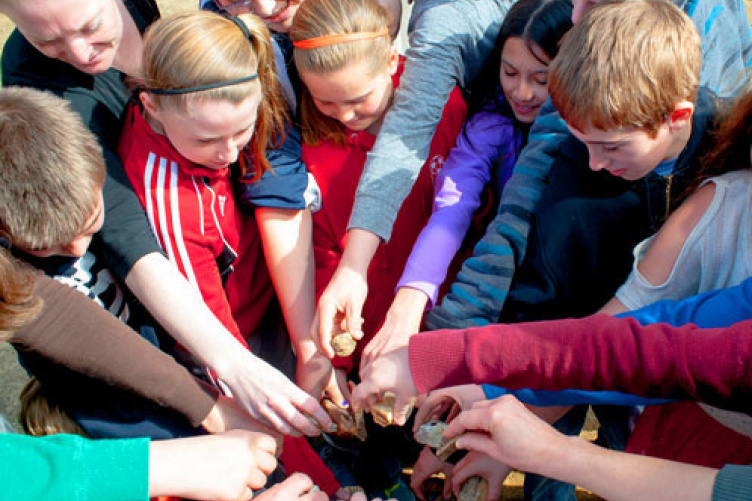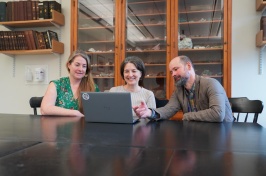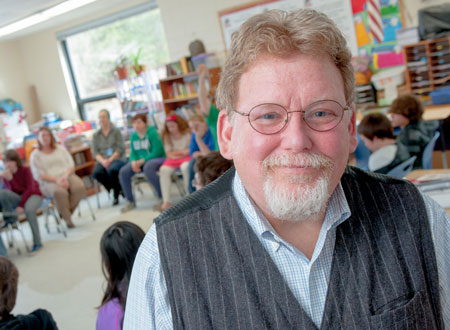
On an early April day that finds rural New Hampshire still lingering between snowbanks and mud puddles, 20 sixth-graders stand in a tight circle outside the Barnstead Elementary School, crowding around a five-gallon bucket filled with water, holding small stones in their hands and waiting for the word, “Go!”
Their teacher, Annie Bourque, explains how the exercise will work as she drops a single stone into the water, noting that the group’s stones will make a much bigger splash when they’re dropped together.
The students have each written their names on their stones, along with a single word that describes what they have learned in this critical year between childhood and adolescence: “Respect!” calls out one student. “Hope!” reads the next. The words tumble out clear across the chilly playground. “Listening!” “Kindness!” “Caring!” “Upstanding!” “Mindfulness!” “Courage!”
These are life lessons that Barnstead’s sixth-graders have thought a great deal about this year, and now promise to keep as they wrap up this last of nine sessions in Courage to Care, a bullying prevention program created by researchers at the University of New Hampshire.
Bourque steps back and calls, “Okay, go!” And 20 stones “Ker-plunk!” into the bucket, splashing water everywhere as the students laugh and cheer.
“Hey, guys, did you notice when the teacher just dropped one rock there was a little splash?” asks Malcolm Smith, a UNH Cooperative Extension associate professor and co-director of Courage to Care. “But when we all dropped them together—huge splash! What we hope is that you’ll take the Courage to Care now and make a big splash at Barnstead, to make this the best school ever.”
NH Program Takes Root
Started in 2011, Courage to Care has grown faster than even its creators could have imagined. In New Hampshire, 150 teachers in 26 schools have completed the three-day Courage to Care training so far, and more than 1,500 students have taken part. The program is also in 40 schools nationwide, with more than 2,000 students participating.
It is gaining attention internationally as well. In January, a team from South Korea’s public broadcasting system visited Barnstead to make a documentary about bullying prevention, which has now been seen by hundreds of thousands of viewers across Asia.
Smith was part of a UNH research team that developed the program, including Rick Alleva and Thom Linehan of UNH Cooperative Extension, Jeff Frigon of the UNH Browne Center for Innovative Learning, and Patrick Shannon of the Department of Social Work. The team recently applied for a $500,000 federal grant to engage students who have been through Courage to Care in efforts to prevent bullying throughout their schools and communities.
At the Barnstead Elementary School, teachers and students laud the program’s hands-on activities, games, journal assignments and “video jolts” that depict young actors from New Hampshire confronting typical, though challenging, situations with their peers. Each exercise poses some difficult questions for the sixth-graders: What’s it mean when you exclude someone from a game on the playground? How would you respond if you saw someone being put down or teased? What if a friend starts spreading rumors about a classmate online? How can you be aware, calm and in control your own reactions when you see something that bothers you? Does it take more courage to stand up to your enemies—or, to your friends?
|
Malcolm Smith, UNH Cooperative Extension associate professor and co-director of Courage to Care. |
The Key: Teaching Civility
“Courage to Care is really just about civility,” Smith says. “And these are really life lessons that I think everyone can relate to.”
The program, Smith adds, is based on research showing that bullying is deeply rooted in the culture and climate of schools, neighborhoods and communities. And the problem is big across the United States, where an estimated 30 percent of all school-aged children report having been victims of bullying. So Courage to Care takes the approach that civility can be taught, and is one of the most effective ways to reduce bullying behavior.
“We believe that young people have often been reduced to roles of “victims,” “perpetrators,” “bullies,” “cyber bullies” or “bystanders,” simply because adults have neglected to take the time to teach them the value of compassion, kindness, empathy and, yes, courage,” reads an introduction to the Courage to Care workbook. The course’s lessons, Smith says, were inspired by his 2010 publication, "Understanding Bullying,” with more than 100,000 copies in print distributed across the country.
Looking around Bourque’s classroom, it’s clear the lessons connect: Throughout the hour-long session, none of her 20 students interrupts, fidgets or appear to drift into a daydream. They sit on the edges of their seats and engage. And each student takes part in nearly equal measure, volunteering his or her questions, observations and answers without first being called upon.
“It’s kind of fun and it really helps people get along better,” says Olivia Casey, 11. “I think it changed my class because we get along better now.”
Classmate Diana St. Laurent, 11, agrees. “I think it’s changed a lot of things here. Like, in fifth grade, people weren’t really all that nice to each other unless they were friends. Now, it’s like we’re nicer to everyone, even if we don’t hang out a lot together all the time.”
Bourque is one of three on the school’s staff, including sixth-grade teacher Christine Vaillancourt and guidance counselor Sara Newell, who took the Courage to Care course at the Browne Center in Durham last summer, with the support of the Barnstead school administration. She says both she and her students have noticed a difference in their demeanor as they took the nine-week course.
“I really think that whether they realize it or not, they really are a little nicer to one another on the whole,” says Bourque, a teacher for 23 years, including six in Barnstead. “They’re a little more mindful now, and a little more tolerant of each other in the day-to-day… You can really see the difference. And what’s neat, is that they see the difference, too.”
As their last Courage to Care lesson wrapped up, Bourque told her students that she would save their rocks, with their inspirational messages written in permanent marker, and set them on their classroom’s windowsill to see for the rest of the school year. Then, the students can take their rocks home along with their other school projects, and the life lessons in civility they gained in sixth grade.
Originally published by:
UNH Today
-
Written By:
Staff writer | Communications and Public Affairs






















































